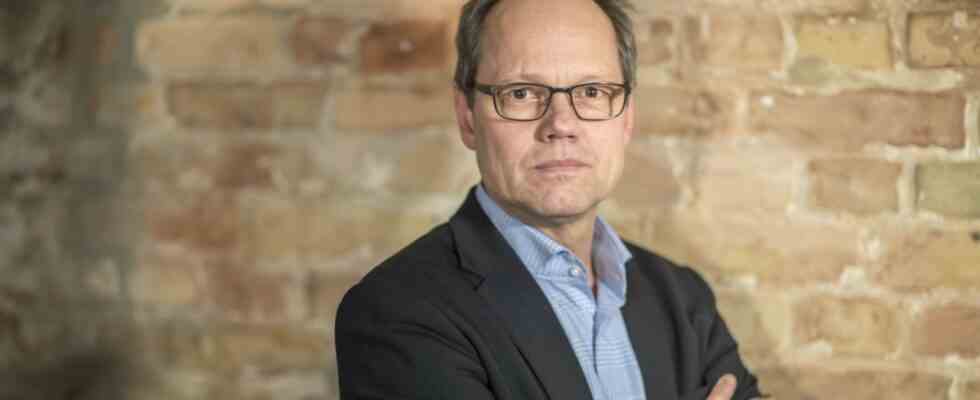mix talk is the name of a new format with which the SWR wants nothing less than to renew the culture of debate on the Internet. Every Wednesday at 7 p.m., anyone who wants can register via the website mixtalk-swr.de engage in a video chat led by four moderators from the station. A random number generator draws participants who then discuss in a pros and cons format for five minutes.
SZ: Why should a public broadcaster try to shape the landscape of debates on the Internet?
Kai Gniffke: Because I’m tired of always complaining about the brutalization of sound in public spaces. Instead we want to do something.
What was the trigger for your anger?
The topic has bothered me for years. That was also the reason why we launched the “Tell me to my face” format when I was still at the daily News was. We felt that sitting face to face instead of chatting anonymously would raise the level of discussion. To some extent, this is now the further development. We want to moderate to reduce the risk of it becoming disrespectful or unfair. So that everyone who comes can be sure: Here you can argue with each other rationally.
On which topics is the culture of debate eroding in Germany?
These were the big social issues in the end: refugee movements, especially before the pandemic, gender-sensitive language. Emotions run high right away. We want to try to negotiate the issues in a respectful atmosphere.
Would a church in the sense of a social network be the next goal?
I have no illusions that we are inventing the new Facebook or Instagram here. our range mix talk is a small plant that is initially there to enable debates on relevant topics. And there is a great need, especially among young people.
How do you know that this need exists?
We conducted user surveys beforehand, and everyone said: Yes, of course I’m interested in all the topics – but many have had experience with hate speech and are therefore no longer involved in the debate. Not because they don’t have an opinion. It’s because they don’t want what happens next.
What about the mechanisms that ensure traffic in social networks: likes, retweets, follower numbers that provide endorphins – did you plan something there?
I can imagine that there are also endorphin releases when you feel like understanding things and each other better. If a discussion brings a result, you are smarter afterwards than before. The approach at mix talk is to create an environment, even with scientific input, that generates good debates instead of generating the greatest excitement and the most clicks. We are not subject to any profit maximization logic. That makes the difference.
And how do you guarantee the quality of the debate? Facebook has 30,000 moderators. You have four.
We have a few fewer users than Facebook, which makes things a little easier. But seriously, netiquette strictly followed is the be-all and end-all. Moderation and enforcement of the rules are key skills. There will also be something called live fact checks.
The first three topics are now speed limit, nuclear power and vaccination. What if someone says Bill Gates wants to plant chips in us?
This is exactly the exciting moment. Then a pack would attack him on social networks and insult him as a conspiracy theorist. at mix talk the reaction would then be: Please justify that, provide us with facts. And then they are checked.
And that in five minutes debate?
In several five minutes – the discussion then develops further. But that is exactly the litmus test – if you are treated properly even with a minority opinion. I’ve already ammunition myself with arguments about the speed limit for the first lap. The day before yesterday I raced down the autobahn at 200 km/h. I’m curious about the discussion, I want to be treated properly and not be beaten down with the argument that I have the environment on my conscience. Then I would like to join the discourse.
Are there any exclusion criteria?
Of course you can block people. By no longer taking them into the “on”. We have to make sure that people are fully clothed, that they don’t hold any unconstitutional symbols in the picture. If someone breaks the rules really grossly, we will stop it immediately. But I think we have to be as tolerant as possible. It would be bad if people had the impression that if I represented the “wrong” opinion here, they would fire me. We also have a system with yellow and red cards, where you are warned before you are expelled.
How big do you estimate the user base?
If we had a round with a thousand people, I think that would be great. We certainly won’t be able to do that the first time. But that would be an initial success.
If people listen to you, then you address young, enlightened, reasonable people. Aren’t you creating your own filter bubble?
The phenomenon of filter bubbles is generally overestimated. In my previous position at the daily News and now at SWR we wouldn’t get so many hate comments if there were real filter bubbles. People are already coming out of their bubble – and want to make their opinion known. We now offer a place where you can express your own opinion – but also be confronted with other opinions. It’s not the goal that we end up with a community that agrees.

